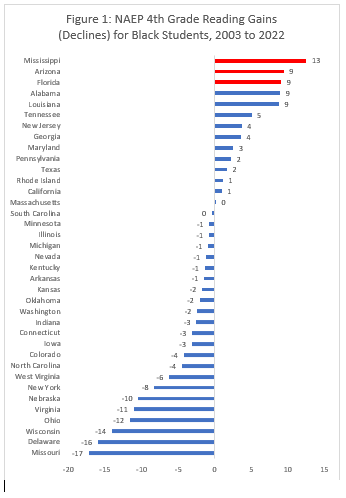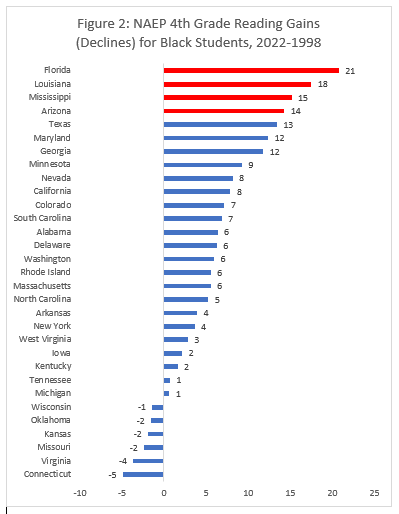 The National Assessment of Educational Progress (NAEP) released “the nation’s report card” recently, which included fourth and eighth grade Math and Reading results for 2022. The results can only be described as devastating.
The National Assessment of Educational Progress (NAEP) released “the nation’s report card” recently, which included fourth and eighth grade Math and Reading results for 2022. The results can only be described as devastating.
 Closing the achievement gap between Black and white students has long served as an aspiration of the education reform movement, but gap closing is a problematic concept. States can – and have – closed gaps as evidenced by NAEP scores by having all students do worse over time, but relatively advantaged groups decline at a faster rate.
Closing the achievement gap between Black and white students has long served as an aspiration of the education reform movement, but gap closing is a problematic concept. States can – and have – closed gaps as evidenced by NAEP scores by having all students do worse over time, but relatively advantaged groups decline at a faster rate.
This is in no way desirable; it’s best to focus on gains for disadvantaged students.
The chart above shows the academic trend from 2003 (the year all states began taking NAEP exams) to the most recent exams in 2022 for fourth grade reading for Black students. Note that on this test, 10 points roughly equals a grade level of average progress.
Mississippi shows admirable nation-leading progress; I have highlighted the top three performers (Mississippi, Arizona and Florida) purposefully.
Mississippi’s literacy strategy has been rightly and broadly praised. The main thrust of Arizona’s education reform strategy, meanwhile, involves the promotion of school choice. Arizona has adopted other reforms like school grading and third grade retention, but these strategies have been poorly executed, with grades getting turned on/off repeatedly and lacking surface credibility, and a third grade literacy gate that is wide open to illiterates to proceed (vanishingly few students retained).
The chart below shows the fourth grade reading trend for Black students between 1998 and 2022.
 Backing the clock up to just before Florida’s election of Gov. Jeb Bush shows the state’s combined strategy (choice and literacy) is far out in front in driving gains. Note also that Louisiana, another state with a combined strategy, jumps into second place in the 1998 to 2022 chart.
Backing the clock up to just before Florida’s election of Gov. Jeb Bush shows the state’s combined strategy (choice and literacy) is far out in front in driving gains. Note also that Louisiana, another state with a combined strategy, jumps into second place in the 1998 to 2022 chart.
As the kids say, game recognizes game. Choice and literacy strategies are not mutually exclusive, and in fact, each strategy can mutually reinforce the other.


